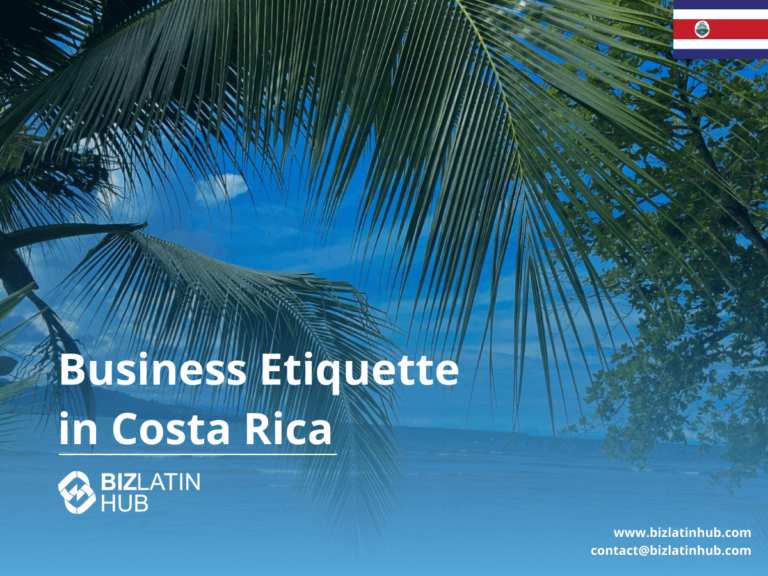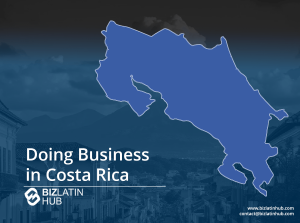Doing business in Costa Rica represents a splendid opportunity to explore vibrant markets in one of the most attractive business jurisdictions in Latin America. With strong sectors that include the service industry, electronic components and tourism, many experienced investors are looking into how to register a company in Costa Rica. Drawing from our client work in San José and across Costa Rica, our team at Biz Latin Hub provides key cultural insights to help you navigate this unique and friendly business environment.
Key takeaways on business etiquette in Costa Rica
| How important is it to build relationships in Costa Rica? | A great deal of importance is placed on building personal relationships and knowing who you are doing business with. |
| Is punctuality important? | Allow plenty of time for delays and overruns and remember that flexibility is important |
| What style of negotiation should you use? | Be prepared to negotiate and business etiquette in Costa Rica requires patience when doing so. |
| Communication | Clear communication in English and Spanish will help both with business matters and with building those personal relationships. |
Business etiquette in Costa Rica and the Central American region
While Costa Rica is a part of the Central American region and shares a lot of its culture and customs due to geographical proximity and shared history, there are points of differentiation that are important to each of the countries in the region. Despite the many similarities, it is important to treat every Central American country as unique.
Here are some business etiquette tips in Costa Rica to keep in mind:
- Tico business culture in Costa Rica.
- Be patient.
- Business talk.
- Networking in Costa Rica.
- Learn language.
- Punctuality
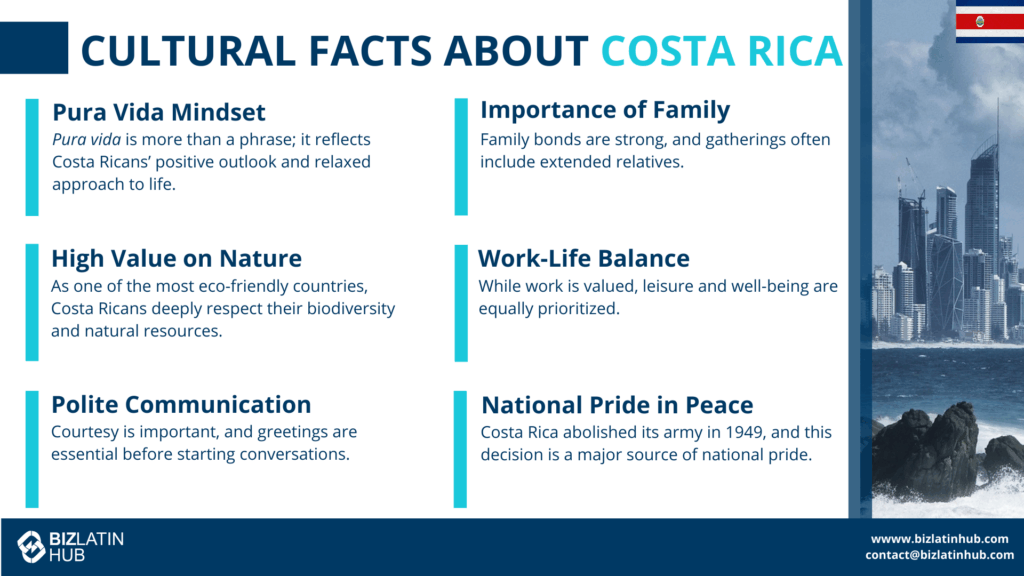
Tico business culture in Costa Rica
Ticos (Costa Ricans) are globally known for being friendly, peaceful and generally relaxed; such characteristics are also prevalent in the business culture. A handshake is customary upon first meeting. Ticos (Costa Ricans) are polite and may greet colleagues with a smile and direct eye contact. Use formal titles like Señor or Señora until invited to use first names.
There is nothing Ticos appreciate more than modesty. Humility is one of the most important values when dealing with Costa Ricans and it directly translates into the business culture. While this doesn’t mean you can’t be proud of and talk up your business, it does mean that this should be done moderately. Do not exaggerate and try not to talk directly about how much you are making unless it is directly related and relevant to the business meeting.
Costa Rican companies can be hierarchical. Senior leaders often make the final decisions, even if junior staff are present during meetings. Be respectful and clear when presenting to decision-makers, and avoid challenging authority publicly.
Doing business in Costa Rica – Be patient
Costa Ricans live a pura vida lifestyle, which literally translates to a pure life, and is a slogan for a relaxed and peaceful society. You must be patient when dealing with public employees and institutions as there can be high levels of bureaucracy in some public institutions. Make sure to be thorough in everything you do (i.e legal procedures, visa applications) to avoid delays and complications.
The ‘Pura Vida’ approach reflects a relaxed but respectful business style. While timelines are important, meetings may begin informally with small talk and warm interactions. This laid-back attitude does not imply a lack of professionalism—Ticos value punctuality and results, even if they communicate them softly.
Business talk
If you’re dealing with someone new, be prepared to establish a relationship first and to have various encounters before closing a deal. In Costa Rica, as with other Latin American countries, individuals prefer to form a relationship with an individual before they engage in business dealings. Costa Ricans are curious and ask general and unspecific questions regarding your business; it will be up to you to offer specifications.
Learn to read their level of interest to see how much you should talk about your business or whether to leave it for a more formal setting at a later date. Begin meetings with friendly conversation. It’s common to talk about family, football, or Costa Rican traditions before addressing business topics. Agendas may not be followed rigidly. Let conversations unfold naturally, and look for cues from the host on when to shift to business.
The importance of networking in Costa Rica
Costa Rica is a very small country with a population of a little more than 5 million people. As such, in the business world, it seems as though everyone knows each other. This is even truer when operating in a particular business sector. Be respectful and honest to all people you have encounters with and try to maintain a good relationship with the people surrounding you. Business reputation and word spread fast in Costa Rica, especially in tight circles.
Costa Ricans appreciate long-term connections. Business decisions may not be made in the first meeting—it can take time to earn trust. Follow-up emails expressing appreciation and restating key takeaways can help build rapport. Invitations to lunch or coffee are common and should be seen as part of the relationship-building process. These interactions may feel casual but are key to deepening trust.” “Bring a small token like local sweets or a thank-you note if invited to a home. Always follow up after the meeting with a polite message.
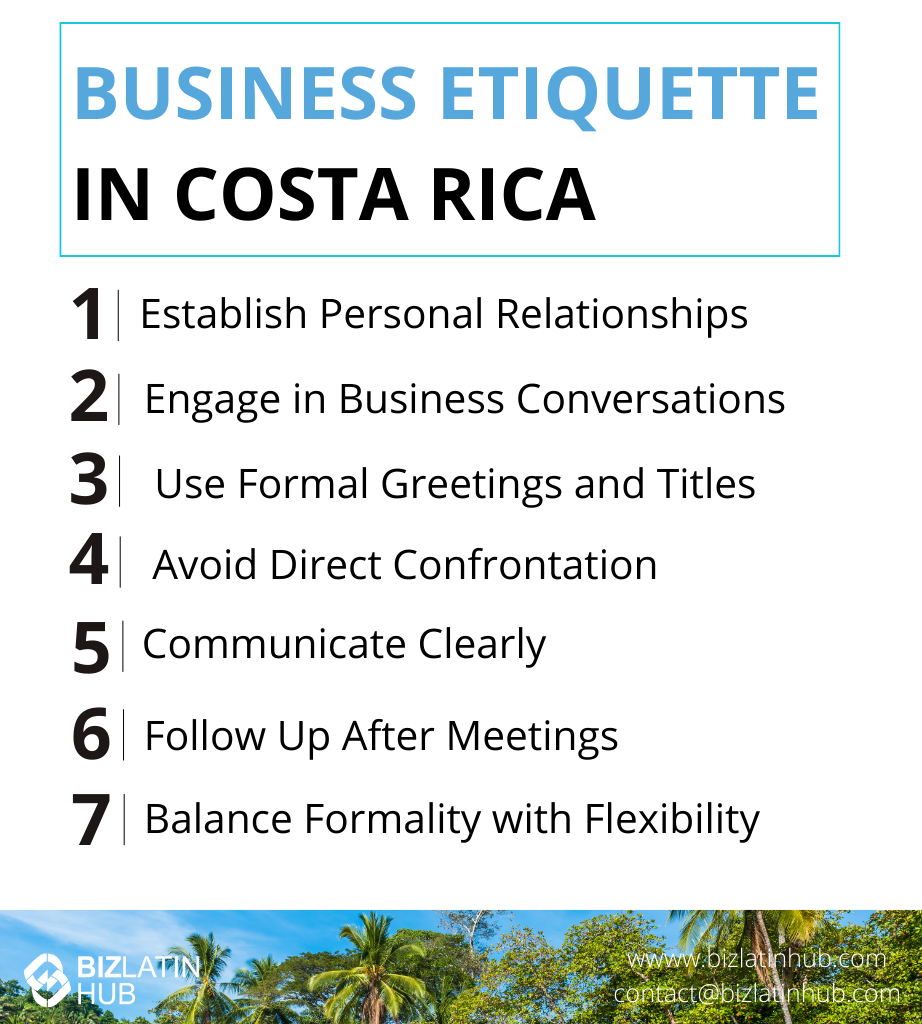
Language – learn it!
Costa Rica boasts a high English fluency amongst the general population, but try to use simple/straightforward language in meetings conducted in English and allow for clarification and rephrasing when possible to avoid miscommunication of any kind. Learning Spanish or even trying out a few words or phrases will go a long way towards establishing more trusting relationships.
When speaking Spanish, Costa Ricans tend to speak with more technical vocabulary. Make sure to ask for the meaning or to rephrase the sentence if you don’t understand – this will be seen as you taking an interest in the meeting specifics. Business in Costa Rica works through communication, after all.
Business attire
Costa Ricans usually dress smart for business meetings, especially when the nature of the meeting is more formal. However, it should be noted that informal meetings do not require formal dress attire. Men usually dress in dress pants and long sleeved shirts, often interchanging a tie for a jacket, with most public employees dressed in a suit. Women’s clothing varies according to the setting, from simple pants to more elaborate dresses and accessories, according to how formal the occasion is.
Punctuality
Like many countries in Latin America, punctuality may not be a priority for everyone. While many businessmen stay true to the established meeting time, others may not be. For this reason, it is better to be prepared for the worst case scenario. See below some important notes regarding appointments for business in Costa Rica.
- Be flexible.
- Be prepared to wait for people to arrive.
- Meetings can run longer than scheduled due to delays.
Try to confirm the time of the appointment with as much notice as possible. This will show your commitment to the success of the meeting in addition to reducing the chance of the meeting being delayed or postponed.
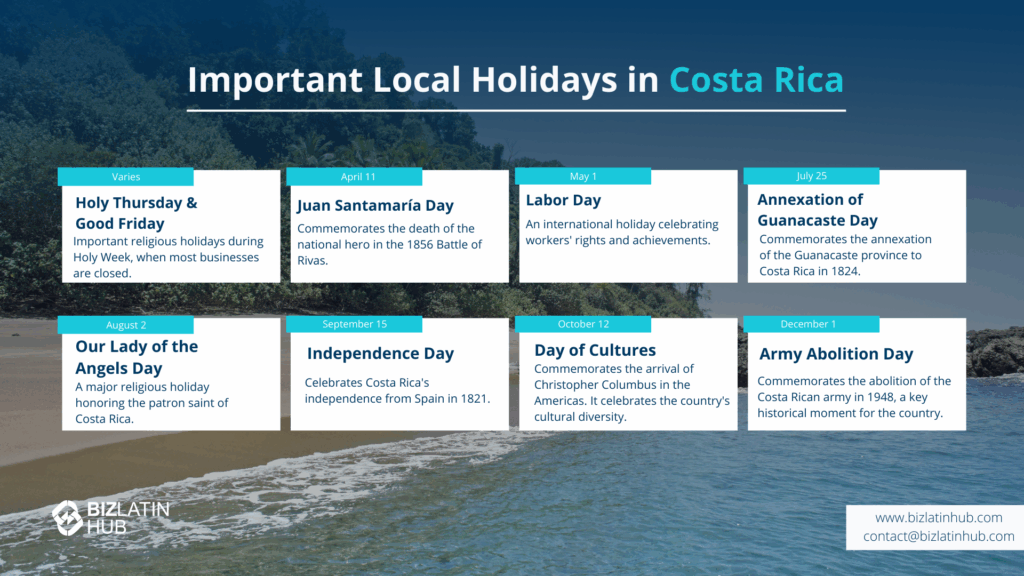
FAQs on business culture in Costa Rica
These are some of the most common questions we receive from international investors interested in business etiquette in Costa Rica.
1. Can a foreigner own a business in Costa Rica?
Yes, by either legal persons (legal entities) or natural persons (individuals).
2. Why do business in Costa Rica?
Costa Rica has witnessed consistent gross domestic product (GDP) growth over the last half-century, totaling a GDP of USD$68.38 billion in 2022. This means doing business in Costa Rica is a secure bet not just today but in the mid-to-long term economic future.
Costa Rica is known for being one of the most developed nations in Latin America, and is a major recipient of foreign direct investment (FDI) in the region, although it is relatively small in size. The country is also a popular destination among ex-pats and tourists from the United States and Europe. Additionally, Costa Rica has some of the lowest crime statistics in Latin America.
3. What does ‘Pura Vida’ mean in business?
‘Pura Vida’ is more than a catchphrase—it’s a cultural mindset reflecting optimism, patience, and warmth. In business, this translates to a calm but focused approach where relationships and respect drive success.
4. Is formality important in Costa Rican business?
Yes, especially at the beginning of a relationship. Professionals dress well, use formal greetings, and respect hierarchy. Over time, relationships may become more relaxed, but professionalism remains essential.
5. How are meetings typically conducted in Costa Rica?
Meetings often begin with small talk and progress organically to business matters. Direct confrontation is rare—Ticos prefer harmonious discussions and consensus-driven outcomes.
6. Do Costa Ricans value hierarchy in business?
Yes, but collaboration is also valued. Senior leaders make decisions, but input from various team members is common. Show deference to rank without excluding junior voices.
7. How long does it take to secure a business deal in Costa Rica?
It depends on the relationship. Trust-building can take time, and decisions may be delayed until a strong personal rapport is formed.
8. Is it appropriate to talk about personal topics during meetings?
Yes. Talking about family, culture, or local events is encouraged and can strengthen relationships. Avoid controversial topics such as politics unless invited.
Why do business in Costa Rica?
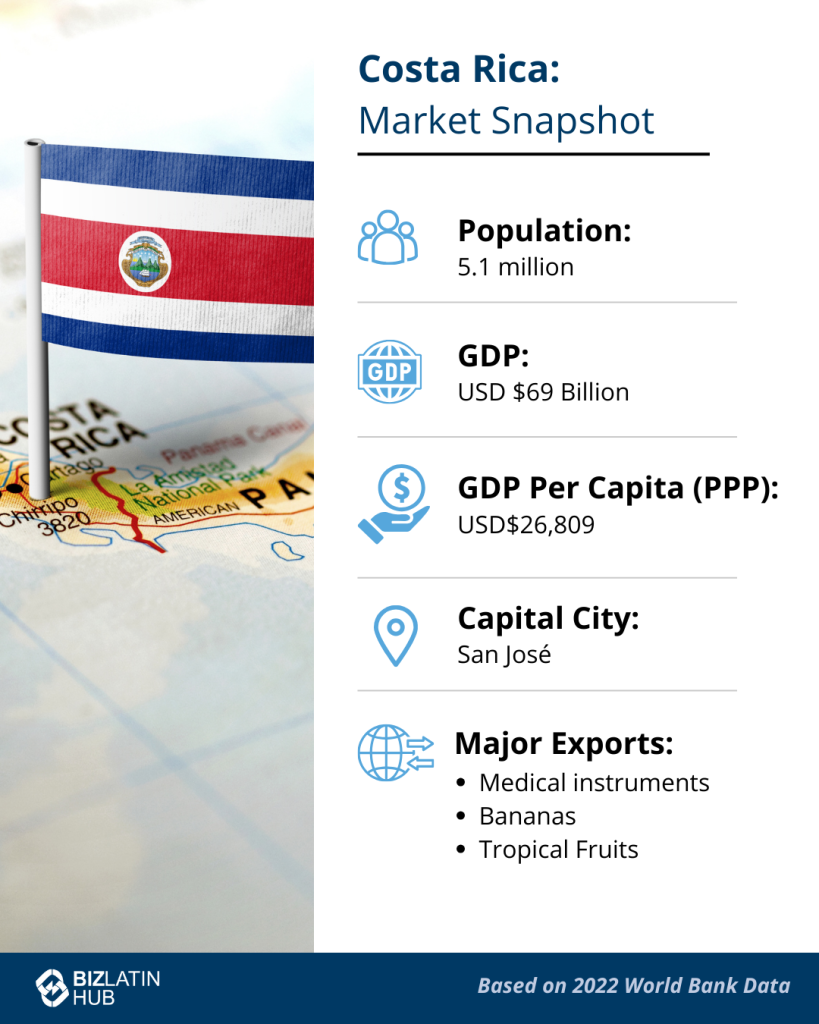
However, as in any new country, it is imperative to possess a solid understanding of how the business culture works before entering the local market. Understanding Costa Rican business dynamics and protocols is essential to your company’s success. By understanding the cultural nuances and local business practices, you will be better prepared to take advantage of opportunities and navigate challenges when doing business in Costa Rica.
Costa Rica has witnessed consistent gross domestic product (GDP) growth over the last half-century, totaling a GDP of USD$68.38 billion in 2022. This means doing business in Costa Rica is a secure bet not just today but in the mid-to-long term economic future.
Costa Rica is known for being one of the most developed nations in Latin America, and is a major recipient of foreign direct investment (FDI) in the region, although it is relatively small in size. The country is also a popular destination among ex-pats and tourists from the United States and Europe. Additionally, Costa Rica has some of the lowest crime statistics in Latin America.
If you are considering starting a business in Costa Rica or are already present in the country, read on to find out what you should take into account when doing business there.
Biz Latin Hub can help you with business culture in Costa Rica
While Costa Rica is a very easy going country, it is always better to work with a local partner who is knowledgeable about the country’s business culture and customs.
Biz Latin Hub is the trusted local partner of many individuals and companies who have expanded their operations to Costa Rica and elsewhere in Latin America. Get in touch with our team of experts today and we will help you and your business expand in Costa Rica.
Learn more about our team and expert authors.

